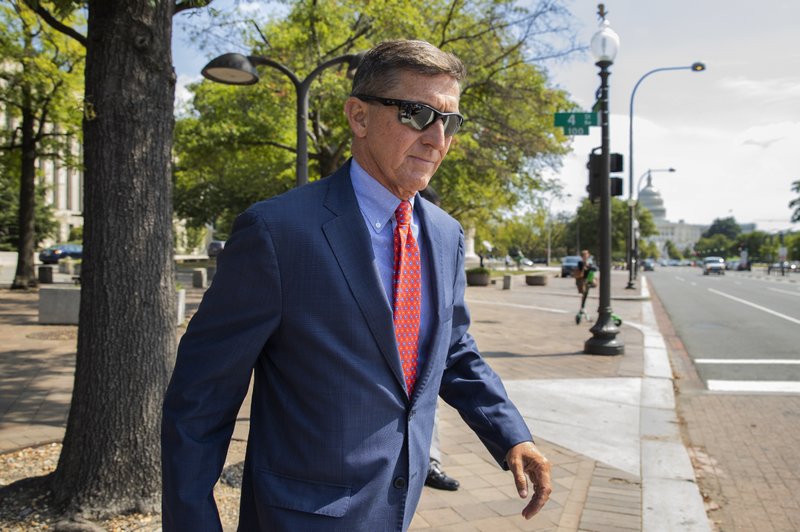A federal appeals court in Washington declined Monday to order the dismissal of the Michael Flynn prosecution, permitting a judge to scrutinize the Justice Department’s request to dismiss its case against President Donald Trump’s former national security adviser.
The decision keeps the matter at least temporarily alive and rebuffs efforts by both Flynn’s lawyers and the Justice Department to force the prosecution to be dropped without any further inquiry from the judge, who has for months declined to dismiss it. The ruling represents the latest development in a criminal case that has taken unusual twists and turns over the last year and prompted a separation of powers clash between a veteran federal judge and the Trump administration.
The conflict arose in May when the Justice Department moved to dismiss the prosecution despite Flynn’s own guilty plea to lying to the FBI about his contacts with the Russian ambassador during the presidential transition period. But U.S. District Judge Emmet Sullivan, signaling his skepticism at the government’s unusual motion, refused to immediately grant the request and instead appointed a retired federal judge to argue against the Justice Department’s position.
His lawyers then sought to bypass Sullivan and obtain a order from the federal appeals court that would have required the judge to immediately force the judge to dismiss the case.
At issue before the court was whether Sullivan could be forced to grant the Justice Department’s dismissal request without even holding a hearing to scrutinize the basis for the motion.
“We have no trouble answering that question in the negative,” the court wrote in an unsigned opinion for the eight judges in the majority.
In a concurring opinion, U.S. District Judge Thomas Griffith wrote that the court’s opinion did not involve the merits of the Justice Department’s prosecution of Flynn or its decision to abandon the case. Rather, he said the question was a much more simple one.
“Today we reach the unexceptional yet important conclusion that a court of appeals should stay its hand and allow the district court to finish its work rather than hear a challenge to a decision not yet made,” Griffith said. “That is a policy the federal courts have followed since the beginning of the Republic.”
He said it was very possible that Sullivan could wind up granting the Justice Department’s dismissal request and that it would be “highly unusual if it did not, given the Executive’s constitutional prerogative to direct and control prosecutions and the district court’s limited discretion” in cases that prosecutors want dropped.
Two judges, Neomi Rao and Karen LeCraft Henderson, each wrote dissenting opinions arguing that Sullivan had overstepped his bounds by keeping alive a case that the Justice Department sought to have dismissed.
The Flynn prosecution was a signature criminal case in special counsel Robert Mueller’s investigation into ties between the 2016 Trump campaign and Russia. Flynn was the only person charged in the Mueller investigation who had served in the White House and he agreed months into the investigation to cooperate with the authorities in hopes of receiving a lighter sentence.
He was questioned by the FBI at the White House, just days after Trump’s inauguration, about his conversations with the then-Russian ambassador to the U.S. pertaining to sanctions that had just been imposed by the Obama administration for election interference. The conversation alarmed law enforcement and intelligence officials who were already investigating whether the Trump campaign had coordinated with Russia to sway the presidential election in Trump’s favor. They were puzzled by the White House’s public insistence that Flynn and the diplomat had not discussed sanctions.
But the Justice Department argued in May that the FBI had insufficient basis to interrogate Flynn about that conversation, which Attorney General William Barr has described as fully appropriate for an incoming national security adviser to have had.
(AP)












4 Responses
So it goes to Supreme Court, or if it takes too long, Trump pardons him. The Democrats will scream “rule of law” and the Republicans will complain about abuse of the judicial system for political purposes. Most of the country has better things to worry about (plague, violence in the streets, unemployment etc.),
Technically the appeals court is correct. Sullivan is being a jerk, and torturing a good and decent man out of pure רשעות, but until he makes a decision one way or the other the appeals court is not supposed to interfere. Unfortunately Floyd must continue to suffer another few months.
If he refuses to dismiss the case then the appeals court should slap him down immediately. If the prosecution wants a case dismissed a judge has no right to refuse. But so long as he has not done that, the appeals court is supposed to give him the presumption that he will do the right thing, and should not be jumping the gun and ordering him to do it.
What the President should do is to immediately appoint him to a senior position, even while he’s technically still facing criminal charges. That would show that the charges are bogus, and the delay in dismissing them is purely a technical matter, and he has the President’s full confidence.
Another case where “political anti-Trump correctness” triumphs.
Obama (ys) and Marxist Democrats together with their corrupt repressive Deep State regime turned America in to Banana Republic where political openness are being persecuted and turn into political prisoners.